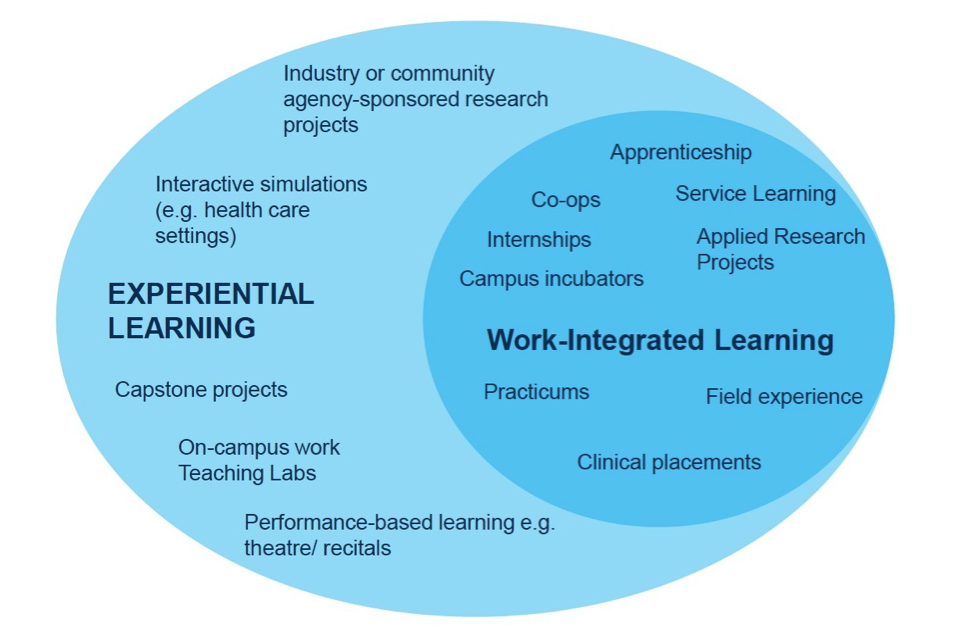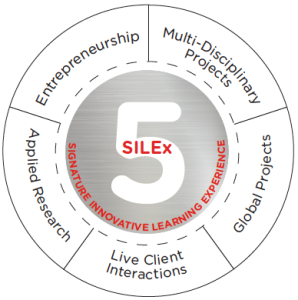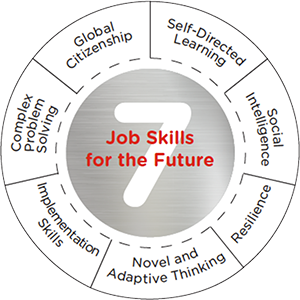1.1 What is Experiential Education?
Experiential education, or learning by doing, takes many forms. Experiential learning activities can be embedded in a course, comprise an entire course, or serve as the focus of a complete term of study. Experiential learning can be introduced early on in a program of study to provide students with early exposure to authentic experiences tied to their discipline or related professions, built into the upper levels of a program to allow students to experiment with applying what they are learning in their courses, or set as a capstone experience to help launch them into the world of work before graduation.
Experiential education is typical in higher education, and increasingly, colleges and universities in Ontario are concentrating their efforts on providing students with experiential learning opportunities situated within simulated or actual workplaces to give students authentic exposure to work environments so that they can judge well what skills are needed and what the work environment is like daily. The Ontario Ministry of Advanced Education and Skills Development has provided a helpful diagram for understanding experiential education:

Many Ontario colleges and universities are considering how the full scope of experiential learning opportunities across program areas correspond to this graphic representation of experiential education provided by the Ministry. However, some institutions have contextualized their vision of experiential learning to align more closely with institutional priorities and values. See Fanshawe’s approach below.
Fanshawe College

Students at Fanshawe are provided with Signature Innovative Learning Experiences (SILEx) and job skills to prepare them for their future careers. Every Fanshawe graduate participates in at least one rich, experiential learning opportunity while studying at Fanshawe. These opportunities include applied research, entrepreneurship, multi-disciplinary projects, global projects, or live client interactions (Fanshawe College, 2020).

Fanshawe College has also identified 7 Job Skills for the Future that all programs in the college embed into their curriculum. These Job Skills are generic to all industries. Competence in these job skills is required for those seeking to build successful careers. Soon-to-be-graduated students must identify these skills in themselves and understand how they can exhibit competence in these skills when meeting with potential employers (Fanshawe College, 2020).
Chapter 2 will explore the Job Skills for the Future in more detail.
Colleges and universities value experiential education to effectively develop students’ competence and confidence in their chosen field. It can help students recognize their passions, knowledge and skills and chart a more straightforward career growth and advancement path. As the Honourable Mitzie Hunter, Minister of Advanced Education and Skills Development, stated in 2017:
Ontario’s students are highly-educated and incredibly talented, but without some work-related experience on their resume, it can be challenging for them to land that first job after school. With support from the Career Ready Fund, students and new graduates will gain the meaningful, real-world experience they need for a successful career start, and employers will have access to talent that can make an immediate impact on their success. (D. Bartucci, personal communication, April 27, 2018)
In short, experiential education can help students recognize their passions, knowledge and skills and chart a more straightforward career growth and advancement path.
Community Partner Testimonial
“When business and marketing professors from the Lawrence Kinlin School of Business at Fanshawe College approached our organization with a chance to benefit from their students’ research, we jumped at the opportunity. Our expectations were exceeded at every step of the process. Under the excellent guidance of their professors, students presented us with clear recommendations to highlight the impact of our work and build our capacity to manage ongoing marketing and communications strategies. They used innovation, analytical skills and strong marketing knowledge to address old frameworks and help us implement effective and user-friendly tools to attract and retain supporters of our mission. Rather than just dropping research and results in our laps, the students put in the extra effort to actually train us how to use the information to deliver results. We can’t begin to offer sufficient words to thank them for their effort and dedication. Thank you!”
Heather Smith, Executive Director
Rayjon Share Care of Sarnia Inc. | www.rayjon.org
“Introduction” in Learning by Doing: Postsecondary Experiential Education by Mary Wilson and Kyle Mackie is licensed under a Creative Commons Attribution 4.0 International License, except where otherwise noted.
“4.2 Seven Job Skills” in Working in Play: Planning for a Career in the Recreation and Leisure Industry in Canada by Linda Whitehead is licensed under a Creative Commons Attribution-NonCommercial-ShareAlike 4.0 International License, except where otherwise noted.

